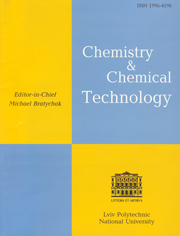Antimicrobial Packaging Materials from Poly(Lactic Acid) Incorporated with Pectin-Nisaplin® Microparticles
| Attachment | Size |
|---|---|
| 1.63 MB |
[1] Cutter C.: Meat Science, 2006, 74, 131.
https://doi.org/10.1016/j.meatsci.2006.04.023
[2] Auras R., Harte B. and Selke S.: Macromol. Biosci., 2004, 4, 835.
https://doi.org/10.1002/mabi.200400043
[3] Krishnamurthy K., Demirci A., Puri V. and Cutter C.: Transact. Am. Soc. Agricult. Eng., 2004, 47, 1141.
https://doi.org/10.13031/2013.16546
[4] Weber C., Haggard V., Festersen R. and Bertelsen G.: Food Additives & Contaminants, 2002, 19, 172.
https://doi.org/10.1080/02652030110087483
[5] Petersen K., Nielsen P., Bertelsen G. et al.: Trend in Food Sci. & Techn., 1995, 10, 52.
https://doi.org/10.1016/S0924-2244(99)00019-9
[6] Aasen I., Markussen S., Moretro T. et al.: Int. J. Food Microbiology, 2003, 87, 35.
https://doi.org/10.1016/S0168-1605(03)00047-3
[7] Jong D., Boumans A., Slaghek T. et al.: Food Additives & Contaminants, 2005, 22, 975.
https://doi.org/10.1080/02652030500336254
[8] Cutter C.: Critical Rev. in Food Sci. Nutrition, 2002, 42, 151.
https://doi.org/10.1080/10408690290825493
[9] Cooksey K.: Food Additives & Contaminants, 2005, 20, 980.
https://doi.org/10.1080/02652030500246164
[10] Kruijf N., Van Beest M., Rijk R. et al.: Food Additives & Contaminants, 2002, 19, 144.
https://doi.org/10.1080/02652030110072722
[11] Garlotta D., Doane W., Shogren R. et al.: J. Appl. Polym. Sci., 2003, 88, 1775.
https://doi.org/10.1002/app.11736
[12] Suyatama N., Copinet A., Tighzert L. and Coma V.: J. Polym. Environ., 2004, 12, 1.
https://doi.org/10.1023/B:JOOE.0000003121.12800.4e
[13] Sodergaard A.: Proceedings of the Food Biopack Conference, Copenhagen, Denmark, 2000, 14.
[14] Alanson A.: J. Food Safety, 1999, 63, 131.
[15] Mustapha A., Ariyapitipun T. and Clarke A.: J. Food Sci., 2002, 67, 262.
https://doi.org/10.1111/j.1365-2621.2002.tb11395.x
[16] Liu L., Finkenstadt V., Liu C.-K. et al.: J. Appl. Polym. Sci., 2007, 16, 801.
https://doi.org/10.1002/app.26590
[17] Liu L., Fishman M., Hicks K. and Liu C.-K.: J. Agricult. Food Chemistry, 2005, 53, 9017.
https://doi.org/10.1021/jf058083w
[18] Motlagh A., Johnson M. and Ray B.: J. Food Protection, 1991, 54, 873.
https://doi.org/10.4315/0362-028X-54.11.873
[19] Alison E. and Delves-Broughton J.: Nisin [in:] Robinson R. (ed.), Encyclopedia of food microbiology. Elsevier 2004, 191-198.
[20] Tramer J.: J. Chem. Ind., 1966, 11, 446.
https://doi.org/10.4319/lo.1966.11.3.0446
[21] Dawson P., Carl G., Acton J. and Han I.: Poultry Science, 2002, 81, 721.
https://doi.org/10.1093/ps/81.5.721
[22] Siragusa G., Cutter C. and Willet J.: Food Microbiology, 1999, 16, 229.
https://doi.org/10.1006/fmic.1998.0239
[23] Thakur B., Singh R. and Handa A.: Critical Rev. Food Sci. & Nutrition, 1997, 37, 47.
https://doi.org/10.1080/10408399709527767
[24] Schilling C., Tomasik P., Karprovich D. et al.: J. Polym. Environ., 2005, 13, 57.
https://doi.org/10.1007/s10924-004-1216-5
[25] Callister W.: Materials science and engineering. 5th edn. Wiley, New York 2000, 800-801.
[26] Liu L., Liu C.-K., Fishman M. and Hicks K.: J. Agricult. Food Chemistry, 2007, 55, 2349.
https://doi.org/10.1021/jf062612u
[27] Brown W.: Plastics in food packaging: properties, design and fabrication. Marcel Dekker, NY 1992.










